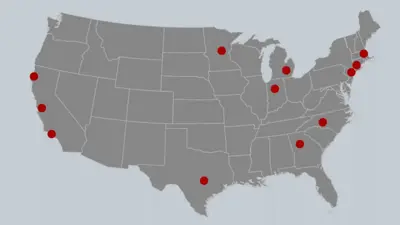We've updated our Privacy and Cookies Policy
We've made some important changes to our Privacy and Cookies Policy and we want you to know what this means for you and your data.
What those living with dementia want people to know
Across the UK, 850,000 people are living with dementia - and soon, if predictions are correct, there will be a million.
Here, some of them, and their families, share their tips for living with the condition, how to talk to people with dementia and how they have learned to adjust to their changing brains.
Don't talk down
Tommy Dunne, who has Alzheimer's disease, says: "If someone said to me, 'How would you communicate with a person with dementia?', I'd say the first thing you want to do is talk to the person, not the dementia.
"The second thing you want to do is get down to the person's level - if the person is sitting on the couch, don't stand over them and talk down, get down to the person's level, maintain eye contact.
"Speak in short sentences.
"Don't ask multiple questions at once - you know like, 'Who, what, why, where and when?' all in the one question - because we can't process that.
"Think about the questions you're asking - don't ask, start a question by saying, 'Do you remember?'
"A lot of people aren't comfortable with silence, so they'll start saying something instead.
"If a carer is with you, they start talking for the person with dementia because they don't like that silence, so they don't want the person with dementia to be embarrassed, so they'll answer the question for them.
"And what happens then is if we don't use it, we lose it.
"So if we're not answering the questions ourselves, we lose the ability to answer the questions ourselves and we'll go further and further into ourselves."
Get organised
"My top tip to cope is to have a diary," Dreane Williams, who has vascular dementia, says.
"Also, with telephone numbers, I've got a photograph of the person or place saved with the telephone number.
"So with the doctor's surgery, I've got a photograph of the surgery.
"That helps me an awful lot.
"I've got a special clock that is quite big and shows me the time, date, day and the year, because sometimes I haven't got a clue what day it is or what month it is."
Paul Hitchmough, who also has Alzheimer's, says: "Living alone, you get into a routine.
"I have a checklist on the door - keys, money, credit card, glasses, everything that I need.
"I've got a bus app, so I know the times of the buses.
"I have a set routine and I write everything down anyway.
"All the things you can't remember, you need to make lists and you need to prompt yourself to look at these lists as well."
Don't give up hope
"My top tip for people that have just recently been diagnosed is don't live your life in fear," Tommy says.
"Don't sit on the couch and vegetate.
"Peer support is so important because we're the only people that can truly have empathy about what it's like to actually live with dementia.
"Join groups of your peers, talk to your peers, learn from your peers, listen to your peers, and in years to come, you teach your fellow peers who are going to be diagnosed what you've learnt because you're the best teacher of what it's like to live with dementia."
Paul says: "When people get diagnosed with dementia, they need to get help as soon as possible.
"They don't need to sit in an armchair and look at television all day, because they're just going to go downhill.
"They need to get out and about.
"They need to understand it's not the end of the world.
"There is hope - you're not going to die tomorrow.
"You carry on with your life and do the best you can."
Ask for help
Christine, who cares for her husband, Gilly, says: "When we got the final diagnosis, nobody told me the parts of the brain that were affected, until probably three years later.
"So I had no idea why Gilly was so angry and why he couldn't make a decision.
"He used to be very loving and he wasn't anymore - he wouldn't hold my hand, there was no empathy.
"Then we saw a psychiatrist and he explained to me that the sections of the brain where the brain cells had died, they were in the parts of the brain that affected decision-making and empathy.
"And it was just like somebody had shone a light on our lives - I wish they'd have told me that before.
"If I was giving advice to other carers, I'd say find out what services are in your area and take advantage of them - sign up to everything.
"Fill your lives with positive things - get a really good group of friends around you who can cope, because some people can't cope with dementia.
"And don't be afraid to ask for help, because I wasn't very good at asking for help.
"You've got to look after yourself as well, because if you don't look after yourself, who's going to look after the person that you love and care for?"
Make life easier
Marion says: "My dementia is a funny name but we call it PCA [posterior cortical atrophy].
"It affects my vision and my spatial awareness.
"I have yellow painted on the doorframes - and that helps me so I know where I am.
"Everything was painted white before - and if everything is white, for me, I don't know where the door stops and the wall starts.
"The colour yellow stands out very well.
"This makes me stay in my house and be independent, which I really want to do."
Keep smiling
"Just because I've got dementia, doesn't mean I've lost all my faculties or anything - it's not the case," Chris, 45, who has familial Alzheimer's disease, says.
"You've got to smile - live life as you can, when you can."
Tommy says: "I am still me, even though I've got dementia.
"I've got dementia, dementia hasn't got me - that's one of the greatest sayings we use, you know."
Dementia & Us is available on iPlayer
Some contributors asked that their surnames be withheld
Top Stories
Features & Analysis
Most read
Content is not available








